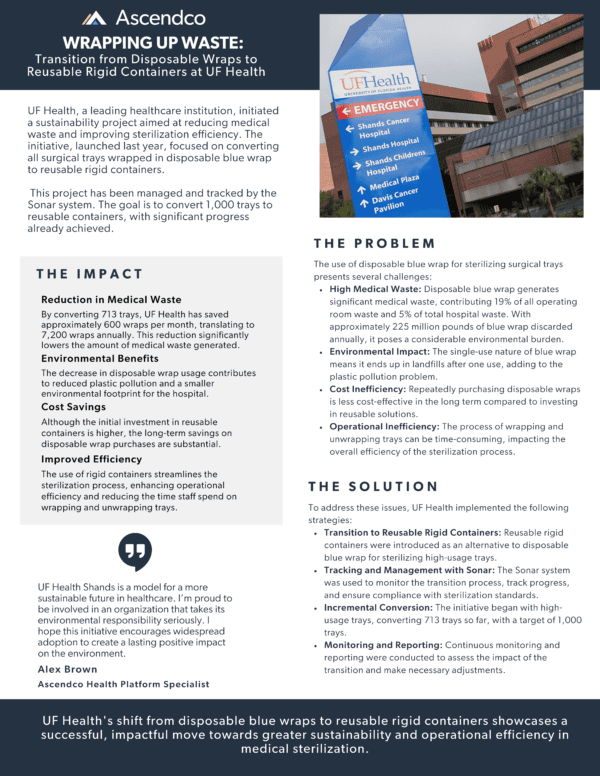In a significant stride towards environmental responsibility and operational efficiency, UF Health has launched an ambitious sustainability project. This initiative, started last year, aims to reduce medical waste and enhance the efficiency of sterilization processes by transitioning from disposable blue wrap to reusable rigid containers for surgical trays. Managed and tracked by Ascendco Health’s Sonar platform, this project sets a precedent for sustainable practices in healthcare.
The Problem
The traditional use of disposable blue wrap for sterilizing surgical trays poses multiple challenges. First and foremost is the high volume of medical waste it generates. Contributing 19% of all operating room waste and 5% of total hospital waste, blue wrap significantly impacts the environment. With approximately 225 million pounds discarded annually, its single-use nature leads to enormous landfill contributions and exacerbates plastic pollution.
Additionally, the recurring purchase of disposable wraps presents a cost inefficiency for hospitals. In the long run, these costs add up, making the investment in reusable solutions more economical. Operational inefficiencies also arise from the time-consuming process of wrapping and unwrapping trays, which can hinder the overall sterilization workflow.
The Solution
To combat these issues, UF Health has implemented a series of strategic measures. The core strategy involves transitioning to reusable rigid containers for high-usage trays, significantly reducing the reliance on disposable blue wrap. This change is meticulously managed and tracked using Ascendco Health’s Sonar platform, which monitors the transition process, tracks progress, and ensures adherence to sterilization standards.
Starting with high-usage trays, UF Health has already converted 713 trays towards their target of 1,000. Continuous monitoring and reporting have been integral to the initiative, allowing for ongoing assessment and adjustments to maximize effectiveness.
The Impact
The impact of this initiative is multifaceted. By converting 713 trays, UF Health has saved approximately 600 wraps per month, equating to 7,200 wraps annually. This substantial reduction in medical waste contributes significantly to lowering the hospital’s environmental footprint and tackling the issue of plastic pollution.
Environmentally, the reduction in disposable wrap usage is a critical step towards mitigating plastic waste. Economically, despite the higher initial investment in reusable containers, the long-term savings from reduced purchases of disposable wraps are considerable. Furthermore, the use of rigid containers streamlines the sterilization process, enhancing operational efficiency and reducing the time healthcare staff spend on the tedious task of wrapping and unwrapping trays.
“UF Health Shands is a model for a more sustainable future in healthcare. I’m proud to be involved in an organization that takes its environmental responsibility seriously. I hope this initiative encourages widespread adoption to create a lasting positive impact on the environment,” says Alex Brown, Ascendco Health Platform Specialist.
UF Health’s pioneering efforts in sustainability not only showcase their commitment to environmental stewardship but also pave the way for other healthcare institutions to follow suit, promising a greener and more efficient future in medical care.

